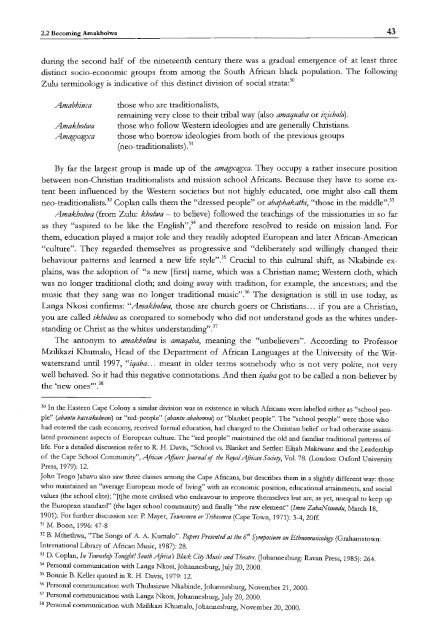South African Choral Music (Amakwaya): Song, Contest and the ...
South African Choral Music (Amakwaya): Song, Contest and the ...
South African Choral Music (Amakwaya): Song, Contest and the ...
You also want an ePaper? Increase the reach of your titles
YUMPU automatically turns print PDFs into web optimized ePapers that Google loves.
2.2 Becoming Amakholwa<br />
during <strong>the</strong> second half of <strong>the</strong> nineteenth century <strong>the</strong>re was a gradual emergence of at least three<br />
distinct socio-economic groups from among <strong>the</strong> <strong>South</strong> <strong>African</strong> black population. The following<br />
Zulu terminology is indicative of this distinct division of social strata: 30<br />
Amabhinca<br />
Amakhoiwa<br />
Amagxagxa<br />
those who are traditionalists,<br />
remaining very close to <strong>the</strong>ir tribal way (also amaquaba or iZichoio).<br />
those who follow Western ideologies <strong>and</strong> are generally Christians.<br />
those who borrow ideologies from both of <strong>the</strong> previous groups<br />
( neo-tradi tion · ali sts. ) 31<br />
By far <strong>the</strong> largest group is made up of <strong>the</strong> amagxagxa. They occupy a ra<strong>the</strong>r insecure position<br />
between non-Christian traditionalists <strong>and</strong> mission school <strong>African</strong>s. Because <strong>the</strong>y have to some extent<br />
been influenced by <strong>the</strong> Western societies but not highly educated, one might also call <strong>the</strong>m<br />
neo-traditionalists. 32 Coplan calls <strong>the</strong>m <strong>the</strong> "dressed people" or abaphakathi, "those in <strong>the</strong> middle".33<br />
Amakhoiwa (from Zulu: khoiwa - to believe) followed <strong>the</strong> teachings of <strong>the</strong> missionaries in so far<br />
as <strong>the</strong>y "aspired to be like <strong>the</strong> English,,/4 <strong>and</strong> <strong>the</strong>refore resolved to reside on mission l<strong>and</strong>. For<br />
<strong>the</strong>m, education played a major role <strong>and</strong> <strong>the</strong>y readily adopted European <strong>and</strong> later <strong>African</strong>-American<br />
"culture". They regarded <strong>the</strong>mselves as progressive <strong>and</strong> "deliberately <strong>and</strong> willingly changed <strong>the</strong>ir<br />
behaviour patterns <strong>and</strong> learned a new life style".35 Crucial to this cultural shift, as Nkabinde explains,<br />
was <strong>the</strong> adoption of "a new [first] name, which was a Christian name; Western cloth, which<br />
was no longer traditional cloth; <strong>and</strong> doing away with tradition, for example, <strong>the</strong> ancestors; <strong>and</strong> <strong>the</strong><br />
music that <strong>the</strong>y sang was no longer traditional music".36 The designation is still in use today, as<br />
Langa Nkosi confirms: ''Amakhoiwa, those are church goers or Christians... if you are a Christian,<br />
you are called ikhoiwa as compared to somebody who did not underst<strong>and</strong> gods as <strong>the</strong> whites underst<strong>and</strong>ing<br />
or Christ as <strong>the</strong> whites underst<strong>and</strong>ing".37<br />
The antonym to amakhoiwa is amaqaba, meaning <strong>the</strong> "unbelievers". According to Professor<br />
Mzilikazi Khurnalo, Head of <strong>the</strong> Department of <strong>African</strong> Languages at <strong>the</strong> University of <strong>the</strong> Witwatersr<strong>and</strong><br />
until 1997, "iqaba... meant in older terms somebody who is not very polite, not very<br />
well behaved. So it had this negative connotations. And <strong>the</strong>n iqaba got to be called a non-believer by<br />
<strong>the</strong> 'new ones",?8<br />
30 In <strong>the</strong> Eastern Cape Colony a similar division was in existence in which <strong>African</strong>s were labelled ei<strong>the</strong>r as "school people"<br />
(abantu basesikolwent) or "red-people" (abantu ababomvu) or "blanket people". The "school people" were those who<br />
had entered <strong>the</strong> cash economy, received formal education, had changed to <strong>the</strong> Christian belief or had o<strong>the</strong>rwise assimilated<br />
prominent aspects of European culture. The "red people" maintained <strong>the</strong> old <strong>and</strong> familiar traditional patterns of<br />
life. For a detailed discussion refer to R. H. Davis, "School vs. Blanket <strong>and</strong> Settler: Elijah Makiwane <strong>and</strong> <strong>the</strong> Leadership<br />
of <strong>the</strong> Cape School Community", <strong>African</strong> Affairs:Journal of <strong>the</strong> furyal<strong>African</strong> Society, Vol. 78. (London: Oxford University<br />
Press, 1979): 12.<br />
John Tengo Jabavu also saw three classes among <strong>the</strong> Cape <strong>African</strong>s, but describes <strong>the</strong>m in a slightly different way: those<br />
who maintained an "average European mode of living" with an economic position, educational attainments, <strong>and</strong> social<br />
values (<strong>the</strong> school elite); "[t]he more civilised who endeavour to improve <strong>the</strong>mselves but are, as yet, unequal to keep up<br />
<strong>the</strong> European st<strong>and</strong>ard" (<strong>the</strong> lager school community) <strong>and</strong> finally "<strong>the</strong> raw element" (Imvo ZabaNtsundu, March 18,<br />
1901). For fur<strong>the</strong>r discussion see: P. Mayer, Townsmen or Tribesmen (Cape Town, 1971): 3-4, 20fE.<br />
31 M. Boon, 1996: 47-8<br />
32 B. M<strong>the</strong>thwa, "The <strong>Song</strong>s of A. A. Kumalo". Papers Presented at <strong>the</strong> 6'" Symposium on Ethnomusicology (Grahamstown:<br />
International Library of <strong>African</strong> <strong>Music</strong>, 1987): 28.<br />
33 D. Coplan, In Township Tonight! <strong>South</strong> Africa} Black City <strong>Music</strong> <strong>and</strong> Theatre. Gohannesburg: Ravan Press, 1985): 264.<br />
34 Personal communication with Langa Nkosi, Johannesburg, July 20, 2000.<br />
35 Bonnie B. Kel1er quoted in R. H. Davis, 1979: 12.<br />
36 Personal communication with Thulasizwe Nkabinde,Johannesburg, November 21, 2000.<br />
37 Personal communication with Langa Nkosi, Johannesburg, July 20, 2000.<br />
38 Personal communication with Mzilikazi Khumalo,Johannesburg, November 20, 2000.<br />
43

















